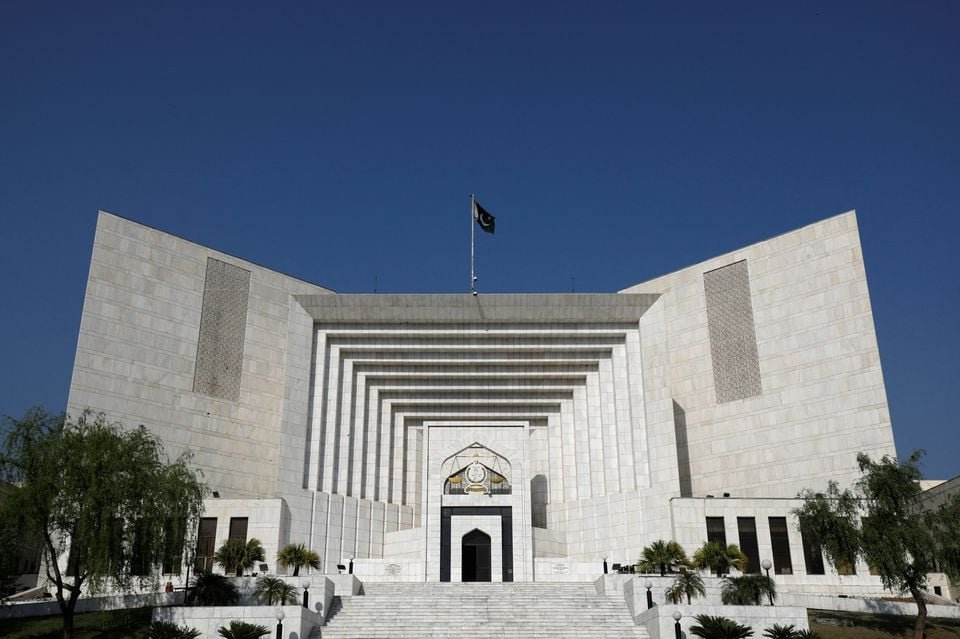Mian Saqib Nisar, born January 18, 1954, is a Pakistani jurist who served as the 25th Chief Justice of Pakistan from December 31, 2016, to January 17, 2019. Educated in Lahore, he graduated with a B.A. from Government College University and an LLB from Punjab University Law College. His career began in law practice before his 1997 appointment as Law Secretary and his subsequent elevation to the Lahore High Court in 1998, where he presided over notable cases on civil and banking matters. In 2010, he was appointed a justice of the Supreme Court, eventually becoming Chief Justice. Known for judicial activism, Nisar faced criticism for alleged political biases and military alliances, particularly regarding the Pakistan Muslim League (N) and Nawaz Sharif’s ousting. His decisions often influenced political affairs, including controversial rulings on security provisions for high-profile politicians during the 2018 elections, which drew allegations of political victimization.
Asif Saeed Khan Khosa, born December 21, 1954, is a retired Pakistani jurist who served as the 26th Chief Justice of Pakistan from January 18, 2019, to December 20, 2019. Prior to becoming Chief Justice, he served on the Lahore High Court and Supreme Court, notably disqualifying two prime ministers, Yousuf Raza Gillani and Nawaz Sharif, for various reasons, including corruption allegations in the “Panama Case.” As Chief Justice, Khosa made unprecedented rulings, including nullifying the extension of Chief of Army Staff Qamar Javed Bajwa, challenging government power in military matters, and supporting judicial autonomy. Educated in law at Cambridge University and Lincoln’s Inn, London, Khosa was known for his judicial rigor and controversial decisions, including landmark judgments impacting Pakistan’s political landscape.
Gulzar Ahmed, born on February 2, 1957, is a former Pakistani jurist who served as the 27th Chief Justice of Pakistan from December 21, 2019, to February 1, 2022. He pursued his early education in Karachi, obtained his Bachelor’s degree from Government National College, Karachi, and his law degree from Sindh Muslim Law College. Beginning his legal career in 1986, he eventually joined the Sindh High Court as a judge and then became a Supreme Court judge in 2011. Ahmed was part of the Panama Papers case bench that disqualified then-Prime Minister Nawaz Sharif, and later became Chief Justice in 2019, appointed by President Arif Alvi. In 2021, he issued an order banning Justice Qazi Faez Isa from hearing cases involving Prime Minister Imran Khan due to a personal petition Isa had filed. His tenure also included significant actions, such as ordering property demolitions across Karachi.
Umar Ata Bandial, born on September 17, 1958, served as the 28th Chief Justice of Pakistan from February 2022 to September 2023. He held a law degree from the University of Cambridge and began his judicial career in the Lahore High Court before becoming a Supreme Court judge in 2014. Bandial implemented reforms in the Supreme Court aimed at improving case management and was recognized as one of Time’s 100 most influential people in 2022. However, his tenure was marked by controversies, including a crisis in the judiciary, calls for his resignation from political leaders, and disputes over judicial appointments and conduct, culminating in a leaked audio scandal involving his mother-in-law that prompted a government investigation.
Qazi Faez Isa, born on October 26, 1959, in Quetta, Pakistan, is the 29th Chief Justice of Pakistan, having assumed office on September 17, 2023. He previously served as a Supreme Court Justice since 2014 and as Chief Justice of the Balochistan High Court from 2009 to 2014. Isa has a notable educational background in law from London and a lengthy legal career, including practicing law for over 27 years. He has been involved in significant judicial cases, advocating for transparency, human rights, and accountability. Isa faced controversies, including a presidential reference filed against him in 2019, which the Supreme Court later struck down, and he has been recognized for his commitment to legal integrity by voluntarily disclosing his assets.

